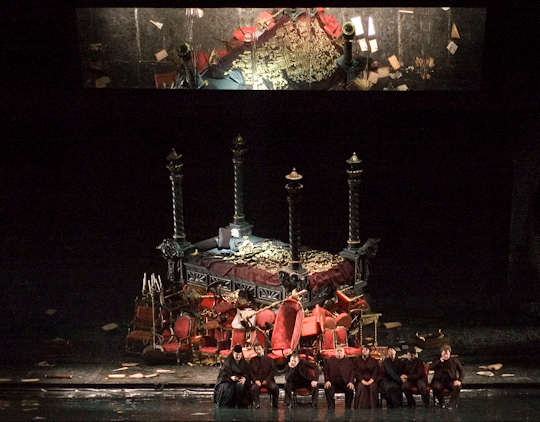Puccini, Il Tabarro, Gianni Schicchi, Suor Angelica: Soloists, Chorus, Children’s Chorus and Orchestra of Teatro Colón. Conductor: Richard Buckley, Teatro Colón, Buenos Aires. 11.6.2011. (JSJ)
Direction/lighting: Stefano Poda
Sets: Daniel Feijoo
Costumes: Cristina Pineda
Chorus: Marcelo Ayub
Children’s Chorus: César Bustamante
Casts:
Il Tabarro
Michele: Juan Pons / Luis Gaeta
Giorgetta: Amarilli Nizza / Haydée Dabusti
Luigi: Carl Tanner / Fernando Chalabe
Talpa: Mario De Salvo / Cristian Peregrino
Frugola: Agnes Zwierko / Alicia Cecotti
Tinca: Gabriel Renaud / Gabriel Centeno
Seller of songs: Duilio Smiriglia
Lovers: Marina Silva / Oriana Favaro, Santiago Bürgi
Gianni Schicchi
Gianni Schicchi: Juan Pons / Luis Gaeta
Lauretta: Beatriz Díaz / Eliana Bayón
Rinuccio: Darío Schmunck
Zita: Agnes Zwierko
Gherardo: Osvaldo Peroni / Gabriel Centeno
Nella: Irene Burt / Vanesa Tomas
Simone: Mario De Salvo
La Ciesca: Alicia Cecotti / Irene Burt
Betto: Leonardo Estévez
Marco: Norberto Marcos
Maestro Spinellocio: Sebastiano De Filippi
Ser Amantio di Nicolao: Fernando Grassi
Gherardino: Guido Sanz / Ramiro Cony
Pinellino: Christian Peregrino
Guccio: Alejandro Di Nardo
Suor Angelica
Suor Angelica: Amarilli Nizza / Virginia Wagner
The Princess: Agnes Zwierko
The Abbess: Lucila Ramos Mañé / Alicia Alduncín
The MonitressCeladora: María Luján Mirabelli / Laura Domínguez
Mistress of the novices: Alicia Cecotti / Florencia Machado
Suor Genoveva: Eliana Bayon / Marina Silva
Suor Osmina: Victoria Gaeta
Suor Dolcina: Oriana Favaro
Novice: Fabiola Masino
Conversas: Gabriela Ceaglio, Montserrat Maldonado
Mendicantes: Laura Polverini, Vanesa Mautner
Although intended as such, Puccini’s triple bill Il Trittico – comprising the three one act works Il Tabarro , Suor Angelica and Gianni Schicchi – probably isn’t performed that frequently in its entirety. Apart from making for a long evening, there is the cost and complexity of a cast and the production.
The Teatro Colón however, has made something of a tradition of the full work: It was third in the world to premiere it back in 1919 and has done it several times subsequently, in addition to several of the more usual “two out of the three” productions. Now, for the first time in almost 15 years the Colón has offered a new – but flawed – production of this work, from the young Italian Stefan Poda.
For a start Poda decided to alter the order of the works, switching Suor Angelica to the last rather than Gianni Schicchi, and offering as justification in his brief program notes that this is more in line with the way tragedies were presented in ancient Greece. However, far from it being “cathartic” as Poda suggested, this reviewer at least, and other colleagues similarly, weren’t left feeling in good humour but rather somewhat uneasy.
But rather more serious were aspects of the production itself. Poda opted, effectively given the vast dramatic and temporal differences, to use the same basic scenery, with minor changes of detail, for all the three works. However, not only were all the settings predominantly dark and monochromic, with the colours all black and greys, there was a large pond across the stage in which the performers were continually walking (and in Gianni Schicchi splashing) – with a large reflecting surface above, presumably for the benefit of those in the stalls to observe this? While such an aspect may be just believable in Il Tabarro , with its setting on and around a barge on the river Seine at Paris, it was certainly not so for the other two works.
The production under review was a strangely less than full “Funcion extraordinaria” with the second, mainly local, cast. The production started, correctly, with Il Tabarro , which is the most dramatic of the three, with a polished performance as Michele from Luis Gaeta, a convincing Giorgetta sung with fine voice by Haydée Dabusti, and an expressive Luigi from Fernando Chalabe.

Then on to Gianni Schicchi, with another outstanding performance from Gaeta in the title role, and notable were Eliana Bayón, with her fetchingly sung “O mio babbino caro” and Darío Schmunck a satisfactory Rinuccio.
And then Suor Angelica, with an emotionally charged title role from Virginia Wagner, and another notable presentation of the Princess from Agnes Zwierko. As with the other works the lesser roles were mostly competently performed, as was the choral work.
Richard Buckley directed the orchestra, exhibiting fine command and control from start to end, and accentuating the dramatic differences between the three works, while maintaining the compositional unity.
Jonathan Spencer Jones
Pictures courtesy of Teatro Colón, Buenos Aires